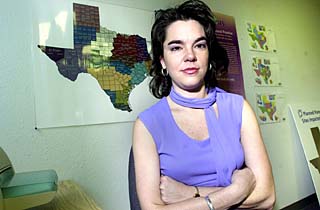Fighting a Rising Tide
Women's rights advocates battle new restrictions on abortion access
By Lauri Apple, Fri., July 25, 2003

Earlier this year, the National Abortion and Reproductive Rights Action League gave Texas a grade of "C-" on the organization's annual state-by-state report card analyzing relative access to abortion services. NARAL -- which now calls itself NARAL Pro-Choice America -- compiled that report before the recently concluded legislative session -- and before the enaction of laws imposing a 24-hour waiting period and extending personhood to embryos and fetuses. Thanks to the 78th Legislature, on the next NARAL report card we can expect Texas to appear somewhere at the bottom of the class, alongside such failures as Arkansas, Pennsylvania, and Alabama.
Two new laws effective Sept. 1, as well as a punitive budget provision currently under court challenge, will impose additional barriers to women seeking family-planning services or abortion services. (See "Picture This: The Lege on Women's Rights," p.28.) By contrast, there were no significant attempts to close existing gaps either in the availability of family planning or the prevention of unwanted pregnancies. The "pro-life" (i.e., anti-abortion) movement, although encouraged by its successes, remains unsatisfied and -- barring an Election Day coup by pro-choicers in 2004 -- will continue to press for additional limitations on women's rights to determine their own life choices and medical treatment. The social-conservative wing of the Republican Party now controls all three branches of Texas government and can be expected to continue its incremental campaign to overturn Roe v. Wade, the landmark 1973 Supreme Court case that originated in Texas and effectively established abortion rights nationwide.
Effective access to those rights is another matter altogether, and limiting access is the direct goal of much of the new legislation, in Texas and elsewhere. Moreover, since the session ended in June, many abortion clinics -- including the Austin Women's Health Center in South Austin -- have seen an increase of enthusiastic anti-abortion protests.
Only 15 of 254 Texas counties have abortion facilities, yet the Legislature seems determined to make abortions even more inaccessible, and therefore access to abortion services is the current focus of most state reproductive-rights advocates. On June 26, six state Planned Parenthood affiliates, including Austin-based Planned Parenthood of the Texas Capital Region Inc., filed a lawsuit against the Texas Dept. of Health over a budget rider that denies family-planning funds -- including federal funds -- to clinics also providing abortion. Acting under a provision included in the new state budget bill, TDH Commissioner Eduardo Sanchez had imposed a June 30 deadline for clinics to either sign an agreement promising not to provide abortions or lose public funding, but Planned Parenthood was granted a temporary restraining order by U.S. District Judge Sam Sparks.
On Friday, July 25, Sparks will decide whether to provide a preliminary injunction pending resolution of the lawsuit by the six named plaintiff affiliates, which together represent 31 Texas clinics -- only seven of which actually provide abortions -- and annually serve an estimated 115,000 clients. While none of Austin's three Planned Parenthood clinics currently offer abortions, the Austin office of Planned Parenthood also joined the suit, because it plans to break ground in September on a new abortion and family-planning facility that (under the new rules) would be denied funding.
Budget Rider 8 -- described by Houston Rep. Talmadge Heflin as "pure and simple" -- does permit the state to grant a waiver to clinics, valid until Aug. 31, 2004, but only if TDH can't find a substitute family-planning provider. Planned Parenthood's suit argues that the rider violates the U.S. Constitution (under the federal supremacy clause) by imposing state restrictions not authorized by the federal Title X, Medicaid, and Title XX programs. While federal law generally prohibits the use of public funds for abortions, Title XIX requires reimbursement for abortions involving rape, incest, or conditions threatening the mother's health.

The rider's authors, Republican Sens. Steve Ogden of Bryan-College Station and Tommy Williams of The Woodlands, say they believe it will survive legal challenge. Freshman Sen. Williams, who had been relatively quiet on the issue as a House member, has emerged as one of the Senate's most adamant anti-choicers. Ogden, who has addressed anti-abortion protests outside Planned Parenthood's Bryan clinic, claims the state can find better family-planning providers, although the nonprofit institution is the nation's best-known provider and has been making abortions available for decades.
Ripples of Denial
"I think most people think every Planned Parenthood clinic is an abortion clinic, and that's not the case," says Texas Association of Planned Parenthood Affiliates political director Heather Paffe. TAPPA, formed last year, lobbies the Lege on family-planning issues on behalf of 85 state clinics. In 2001, Planned Parenthood performed 15% of Texas' 70,000 abortions -- and those abortions amount to 2.3% of all client visits. Most patients using Planned Parenthood clinics earn less than 150% of the federal poverty-level income and utilize other services such as Pap smears and breast-cancer screening.
Planned Parenthood has needed to file similar lawsuits in other states. In Missouri, the organization spent nearly a decade fighting almost identical legislation. At times, says Paula Gianino, president and CEO of Planned Parenthood of the St. Louis region, the Missouri affiliates would endure one- or two-year periods without state funding, enabling fewer women to receive services. In both state court and the federal 8th Circuit Court of Appeals, Planned Parenthood cited constitutional protections and won -- but not for long. This year, citing budget shortfalls, the Missouri Legislature ended family-planning funding entirely. (Legislators also passed a 24-hour waiting period, vetoed July 9 by Democratic Gov. Bob Holden.) "A lot of effects [of funding shortages] aren't felt for months and years afterward," Gianino said. "Women don't just go and get services somewhere else -- they just don't get them."
If Rider 8 prevails, Texas women and men -- particularly poor Texans -- will face additional challenges obtaining family-planning services. Planned Parenthood's West Texas affiliate, headquartered in Odessa, represents four clinics (including an abortion clinic in Midland, the only such provider in the region) serving 10,000 clients from 50 counties and Eastern New Mexico. Seven thousand of the clinic's patients receive services thanks to the endangered Title XX funding. Due to the weak economy, the number of clients is increasing, says Community Affairs Vice-President Carla Holeva. Some patients travel four or five hours for abortions, and others drive long distances simply to obtain birth control. Area health centers, including those run by the state, rely on Planned Parenthood to serve minors seeking contraception, Holeva says. "They are so freaked out about the minor-access issue, that they just refer all their minors to us."
The Right to Ignorance
Planned Parenthood's suit is yet to be argued, but anti-abortion bills passed this year will go into effect Sept. 1. The most notorious is HB 15 -- cynically titled the "Woman's Right to Know Act" -- authored by Rep. Frank Corte, R-San Antonio. The law will require abortion providers to make available to prospective patients sensational information featuring full-color photographs of fetal development and alleging statistical links between abortion and breast cancer. (Moreover, the Texas Dept. of Health will charge abortion providers for the information, which is still in development.) Yet research organizations ranging from the American Medical Association to the National Cancer Institute have found no link between abortion and cancer.
The law also imposes a 24-hour waiting period for women seeking an abortion. As the West Texas example illustrates, this is an often onerous requirement -- not mandated for any other legal medical procedure -- that is an additional time and financial burden on women who have little time and less money. Several legislators, including Austin's Rep. Dawnna Dukes and Sen. Gonzalo Barrientos, expressed outrage that even victims of rape or incest will not be exempt from the waiting period.
A less publicized provision is the requirement that abortions after the 16th week of pregnancy must be performed in an ambulatory surgical center, which are typically designed for general surgical procedures not requiring an overnight stay. Currently, no Texas family-planning clinics meet that requirement. Retrofitting clinics to meet the new standard is both complicated and expensive, with single-facility estimates ranging from $1 million to $2.5 million. In anticipation of Corte's legislation, Planned Parenthood's local affiliate planned its new facility accordingly; the organization's clinic in Houston, however, must choose between ending abortion services beyond 16 weeks or finding other providers.
On the House floor, Corte claimed the law would broaden opportunities for women seeking abortions -- but did not explain how that might occur. Other than licensing, nothing currently prevents existing ambulatory surgical centers from legally performing late-term abortions -- if providers are willing to endure harassment and threats from anti-abortionists. Facilities performing late-stage abortions are extremely rare; under the new law, many women will be forced to leave the state.

Austin Planned Parenthood spokeswoman Danielle Tierney calls the retrofitting requirement "the most egregious part of the bill," because its effects will be felt most harshly by women in the most difficult circumstances. Most women seeking second- or third-trimester abortions, Tierney says, do so either because they have been avoiding facing their pregnancy; are frightened teenagers who have waited too long; or want a child but have learned that something has gone awry with their pregnancy.
Flank Attacks and Backlash
A bill that attacked abortion rights less directly is SB 319, aka the "Prenatal Protection Act," authored by Sen. Ken Armbrister, D-Victoria. Armbrister's bill defines a fertilized egg or embryo as an "individual" -- literally, "an unborn child at every stage of gestation from fertilization until birth." Although the law expressly excludes the mother herself and medical providers from its punitive effects, it creates a distinct criminal offense of causing the death or injury of any unborn child during the commission of other crimes. Fourteen other states have passed such laws, and 13 enforce laws that apply only to fetuses. (Congress is also considering an "Unborn Victims of Violence Act.")
The law is explicitly intended to impose greater penalties on violent offenders (even those who, because they don't know their victims are pregnant, are acting without intent). But its potential secondary legal effects remain uncertain. Opponents warn that the law may create a precedent undermining legal abortion, because it is now defined simply as an exception to a law that otherwise forbids ending the life of an "unborn child."
There were a few positive signs during the session. Sen. Jeff Wentworth, R-San Antonio, authored SB 1339 and SB 1393, which, had they not died in committee, would have made emergency contraception (the "morning-after pill") available from trained pharmacists and also to rape victims. Reproductive-rights advocates say that simply getting such bills filed had been unprecedented in Texas.
Democratic Rep. Glenn Lewis of Fort Worth -- one of nine members of the all-male State Affairs Committee that considered most abortion-related legislation -- frequently sided with his Republican colleagues in voting to approve anti-choice bills. The other Democrat on State Affairs, San Antonio Rep. Mike Villarreal, says he felt "inadequate" as the committee's only consistently pro-choice vote. "I think there is something unique that a female legislator brings to this argument," he said. "But I can't do anything about my gender."
Democratic Reps. Jessica Farrar of Houston and Austin's Dawnna Dukes delivered impassioned speeches in defense of women's rights for the record on the House floor, but the Republican majority paid little mind. "They just tell you, 'No,'" Dukes said. "It's about government dictating to women but placing no [similar] provisions on men."
If there's one positive result of the rightward lurch of the Legislature on women's reproductive rights, it's that all the advocates interviewed for this story say their members are angry and energized and that donations have been growing. They hope that next year's elections will confirm that progressive voters have truly been paying attention.
In preparation, the Texas Abortion and Reproductive Rights Action League, Planned Parenthood, TAPPA, and other groups are coming together to address strategy. Holding elected officials accountable isn't impossible, says TAPPA political director Heather Paffe, but it won't be easy. During the session, several legislators told her to stop encouraging pro-choice voters to call their offices. At the same time, Paffe says, "If we don't call we get criticized that they didn't hear from us."
The biggest challenge pro-choice groups face has been convincing the younger generation -- at least those among them with financial options who are accustomed to ready access to reproductive services -- that their right to choose is increasingly vulnerable. "Most women take reproductive rights for granted," said Paffe. "They don't perceive much of a threat." The same can be said for many voters supportive of abortion rights and family planning. Even while both the federal government and state legislatures have been steadily chipping away at both express rights and effective access to abortion, polls suggest that most Americans believe their elected officials are pro-choice.
According to Mary Jane Gallagher of NARAL Pro-Choice America, the "bad news" is that what just happened in Texas is increasingly typical in the U.S.
"State legislatures across the country, as well as the presidency, are now being run by anti-choice men," she said. "It's a tide, and all we can do is hope to turn the tide." ![]()
Got something to say on the subject? Send a letter to the editor.
Read more of the Chronicle's decades of reproductive rights reporting here.








